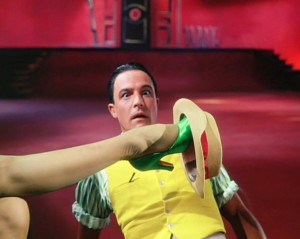Thank you to everyone who came to my inaugural lecture last night at UEA! One of the scenes I discussed in particular was talked about during the reception afterwards. I introduced it in the context of ‘polio dancing’, and it followed an extract of reggae band Israel Vibration doing their thing in the video of ‘Rudeboy shuffling”. So here it is again….
…One other polio dancing routine. This star of musical film contracted polio as a child in the early 1930s in an epidemic in Texas. She was encouraged to take up dance by her parents as a form of physical therapy to work on her lower limbs muscle capacity and strength. She was lucky: her legs were affected by polio, but it was her legs that would make her famous. As an older woman she would mention in interviews that she thought her back muscles remained partially atrophied from her childhood bout of polio.
The wider point is one of the complex relationship between disease, symptoms, disability, therapy, treatment. Jazz musicians like saxophonist David Sanborn or pianist Horace Parlan were polio kids who were encouraged to take up their instruments in childhood as an element of their physiotherapy and recovery; as Marc Shell has noted, ‘[f]or some polios, more than for most other people, performing music is a supremely athletic challenge’.
For each, Sanborn and Parlan, as well as for the Texan polio girl who became dancer Cyd Charisse, it is arguable that the successful musical career came about because rather than in spite of the childhood disease, musicality and performance originating as a therapeutic response to the residual symptoms of the medical condition. [film extract used in lecture: 0.22-2.20]
Crikey. What is it Ian Dury sings on a piece of his called ‘The body song’? ‘The leg, a source of much delight /It carries weight and governs height’. I think there’s a bit more going on with these legs. I mean, look at the effect they had on Gene Kelly.

